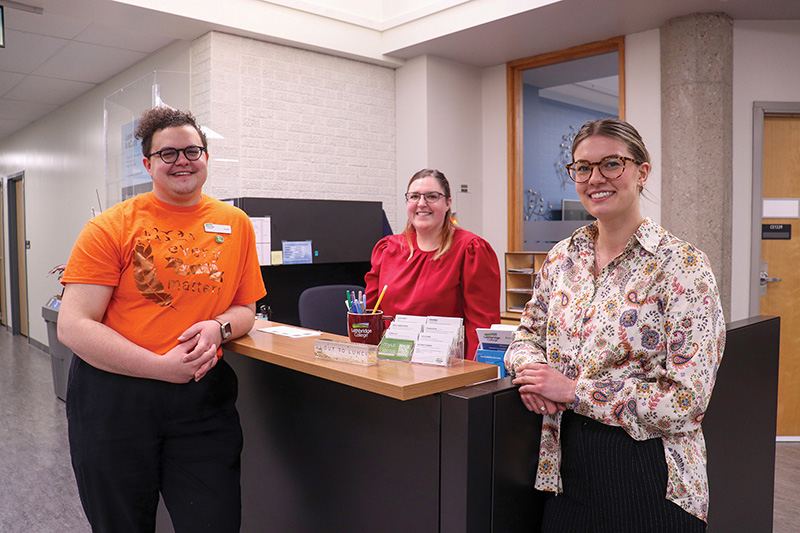Some of the friendly faces you can expect to see when visiting the Learning Cafe. From left to right, Jude Bialik, Glenna Fowler and Elizabeth Eremenko. Bialik and Eremenko are available for appointments to help with your academics.
Being a college student is hard. Existing in general is hard.
Elizabeth Eremenko and Jude Bialik from the Lethbridge College Learning Cafe shared some tips to make it easier. Dalaine Kubik, a therapist at the college, weighed in on these tips.
Know how you learn
Knowing your learning style, whether that’s videos, reading or writing, can help you be more successful in your academics and lower frustration and feelings of inadequacy.
Bialik recommended reaching out to your teachers for alternate resources like books or videos. They also acknowledged the importance of trying different things out.
“You don’t have to learn how people are telling you you have to be taught,” Bialik said.
Kubik said knowing your learning style allows you to work with your brain instead of against it.
Bialik had a similar thought, saying “just because something doesn’t work doesn’t mean that [you’re] stupid.”
Have self-compassion
Being compassionate to yourself can be very difficult but extremely rewarding.
Kubik said many of us use self-criticism as motivation to succeed, but it often increases our stress levels, ultimately making it more difficult to achieve our goals.
“When we choose to incorporate self-compassion, we choose to approach ourselves with the same kindness we would offer to a friend or loved one who was having a difficult time,” she said.
Eremenko said we get hyper-fixated in academics, mistakenly thinking we have to get really good grades or have to be studying all the time.
“It’s really important for students to step back and realize that a whole part of the process, being in college and learning, is the soft skills, the social skills, and the social experience beyond what you’re learning in the classroom.”
Avoid burnout
In our society, many of us tie our self-worth to our productivity which can easily lead to burnout.
“Taking care of yourself is productive in a sense. It avoids burnout, you’re keeping your brain sharp, you’re doing something that you like so you can be more effective and happier and more willing to learn and engage,” Eremenko said.
She also said she often has to specifically schedule rest time, self-care time, or time to do something that makes her happy into her day.
Kubik mentioned scheduling larger self-care as Eremenko did, but also acknowledged the little things.
“It’s just as important to incorporate small doses of self-care throughout the day, such as making yourself a cup of tea or coffee, opening a window, listening to music, or moving around the room,” she said.
Set boundaries
Setting and upholding boundaries is something that most of us probably need practice with.
“You set boundaries with other people, but you have to set boundaries with yourself too like with what your limits are. Unfortunately, a lot of it is trial and error,” Eremenko said.
She said when she was in school, she wouldn’t study past 10 p.m. to avoid creating a cycle of being tired and unproductive.
“Prioritize yourself more than you prioritize your use value to the extent that you can,” Bialik said.
According to the Marxists.org glossary, use value is “the concrete way in which a thing meets human needs.” Essentially, you are more than how you can be useful to other people.
Kubik offered some practical advice on how to set and uphold your boundaries.
“Examine why it is important to you to establish these boundaries and come back to these reasons when setting or maintaining them becomes challenging,” she said.
If you are struggling with your academics, the Learning Café has staff and peer tutors. If you need additional mental support, Wellness Services has counsellors. For more information or to book appointments, go to lethbridgecollege.ca/learningcafe or lethbridgecollege.ca/wellness.



